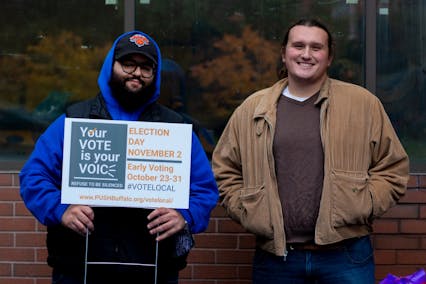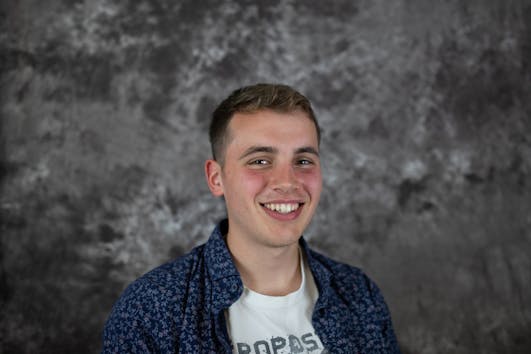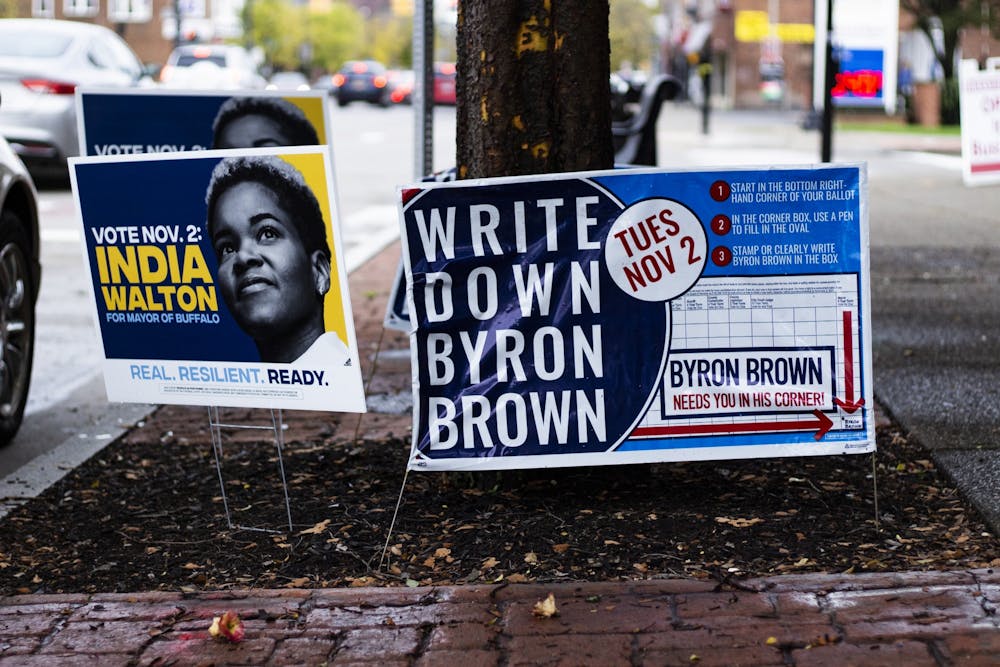UB community members have donated at least $58,335 to the two major candidates in Tuesday’s Buffalo mayoral race.
Democratic nominee India Walton and write-in candidate Byron Brown have both received financial backing from UB community members — but the two candidates sharply diverge on the source of these donations.
Current and former UB faculty members donated almost exclusively to Walton’s campaign. Walton, a 39-year-old socialist who upset Brown in June’s Democratic primary, counts three current and former professors — retired law professor Martha McCluskey, current American and Africana studies professor Carl Nightingale and retired English professor and Pulitzer Prize-winning poet Carl Dennis — as her top three individual donors.
McCluskey and Nightingale, a married couple, donated $5,000 and $5,200 respectively to Walton’s primary campaign. They followed up those initial contributions with $7,797 and $7,797.90 donations to Walton’s general election campaign, for a total of $25,794.90.
McCluskey says this is the most she has ever given to a political campaign because she saw Walton’s run as an opportunity “to make the community better for all” and “to revive [our] commitment to meaningful democracy, debate and public participation in decisions.

“For too long, too many Buffalo leaders have played into a tired and insular politics, with the same-old, same-old vision of trickle-down economics and power,” she told The Spectrum in an email. “The university and the City of Buffalo have become pipelines for what could be called socialism for a small group of wealthy developers and associated elite business interests. In both UB and the city, too many major decisions about public funds are made behind closed doors by relatively small, overlapping inner circles with ties to the contractors and firms who benefit from that spending.”
Nightingale did not respond to a separate request for comment.
For his part, Dennis contributed $3,500 to Walton’s primary campaign and $7,796 to her general election effort, making him Walton’s third largest individual contributor.
“The new Buffalo under Brown is the old Buffalo we thought we were leaving behind, so desperate for investment that any building is better than none,” Dennis told The Spectrum in an email. “Only now the motive is not desperation but greed, [and Brown is] getting political donations from those who don't want the [zoning] code to apply to them. I'd like to believe Buffalo is better than this.”
Other UB faculty members made smaller but, still noteworthy, contributions to Walton’s campaign. English professor Rachel Ablow gave $2,920 over the course of five donations. Physiology professor Susan Udin contributed $2,275 through six donations. Former political science professor Stephen Halpern donated $500 and made a $1,600 non-monetary contribution. And Sam Magavern, an adjunct professor with the UB School of Law, gave $4,000 over the course of five donations.
Magavern declined to comment because of his position as a senior policy fellow with the Partnership for the Public Good, a Buffalo-based “community-based think tank.” Udin also declined to comment because of her position in a local non-profit. Ablow and Halpern did not respond to requests for comment.
UB employees are allowed to contribute to political movements but “cannot use state resources and time for partisan political purposes,” UB spokesperson John DellaContrada said in an email.
The Spectrum couldn’t identify any instances where a UB faculty member donated to Brown’s campaign.
“I don’t know why and how people at UB are donating,” Brown said in an interview with The Spectrum last week. “I have been a professor, as well. I’m teaching students [at Buffalo State College], mostly at the master’s level, in state budgeting, political science and public policy. And I am a professor of practice, meaning that I have a theoretical background, but I also have a practical background in actually working in these arenas …So why professors would not be drawn to somebody of that background and would be drawn to somebody with no theoretical background in governing and governance and [who] has no relevant experience in government is somewhat curious.”
But members of the UB Council — who are appointed by the governor and act as “the primary oversight and advisory body to the University at Buffalo and its president and senior officers,” according to its website — did donate to Brown’s campaign.
Jeremy Jacobs, president of global hospitality company Delaware North, owner of the Boston Bruins and the Council’s chairman, donated $5,000 to Brown’s campaign shortly before Primary Day. Jacobs has been contributing to Brown’s campaigns since at least 2006 and gave $1,000 in 2017.
Jacobs’ son, Jeremy Jacobs, Jr., also gave $5,000 to Brown’s campaign this year.
Jonathan Dandes, corporate vice president at Rich Products Corp. and a UB Council member, gave Brown’s campaign $4,950 over the course of seven donations this year. Dandes also contributed $1,500 in 2020.
UB Council members Scott Friedman, René Jones and Christopher Koch have all donated thousands of dollars to Brown’s previous campaigns but did not contribute this election cycle. Koch, the CEO of New Era Cap Company, gave $1,000 to Brown under the address of his company’s flagship store in Buffalo. Koch has used that address to give $62,600 to various campaigns and PACs between 2006 and 2018. Another council member, Michael Cropp, has never donated to Brown but gave $7,750 to the 43x79 PAC, a Buffalo-based pro-business group, between 2013 and 2018. 43x79 contributed $13,100 to Brown’s campaign this election cycle, making it his single biggest donor.
Nobody on the UB council donated to Walton’s campaign.
The Council’s office acknowledged a request for comment, but no members of the council immediately responded to that request.
“People know that I treat all members of the community with respect and dignity and am supportive of the active participation of all members of the community,” Brown said. “Businesspeople in Buffalo and Erie County, developers in Buffalo and Erie County are supporting my candidacy as people who have built things and created job opportunities that are fueling progress in our city and region. They should be able to have a say in the future of this community.”
Jacob Neiheisel, a professor of political science, says he doesn’t know for sure why individual faculty and council members donated to one candidate over another, but his “gut reaction” tells him that the sharp contrast in the groups’ donation patterns follows national trends.
“It’s not a secret in surveys of faculty nationwide that they tend to be more liberal than the population at large,” Neiheisel said. “That does not terribly surprise me that they would donate to the more expressly liberal candidate in the race. ...Council [members] are responsible for the strategic direction of the university, in large part, and so I tend to think of them as wanting the status quo — or at least appreciating the status quo. Or it might be [because] some of those folks are involved in the business community.”

UB administrators do not appear to have donated much this election cycle. Jean Wactawski-Wende, dean of School of Public Health and Health Professions, contributed $250 to Democratic-nominee Austin Tylec’s campaign for mayor of North Tonawanda. Rodney Grabowski, vice president for philanthropy and alumni engagement, gave $500 to Erie County sheriff candidate Karen Healy-Case.
Healy-Case dropped out of the race and endorsed Democratic nominee Kimberly Beaty, even though she earned the Conservative Party nomination, according to WBFO.
The Spectrum could not identify any UB administrators who donated to either Brown or Walton’s campaigns.
“Under SUNY policy, the decision to donate to a political candidate is a personal one for all UB employees, including the president and provost,” DellaContrada said. “It would not be appropriate for officers of the university to discuss publicly their personal reasons for choosing to support candidates or not.”
While he says it could be attributed to “any number of things,” Neiheisel suspects “fear of reprisal” may be preventing administrators from weighing in financially.
“Either way, there’s some risk involved,” Neiheisel said. “If you need the goodwill of the city, you need good working relationships with people in the [mayoral] administration. That could become difficult if you're on the losing side [of the race].”
But despite administrators not contributing financially, the race has still drawn in millions of dollars. Since entering the race on Dec. 13, 2020, Walton has raised $922,684.38. Brown has raised $1,677,198.67 during the same period.
“It’s unusual around here, given that we haven’t really seen a super serious challenge for mayor in 16 years,” Neiheisel said.
In accordance with SUNY policy, the university will not be supporting any candidate for any local or state race, DellaContrada said.
But that doesn’t mean that the outcome of the mayoral election won’t affect UB “in some small measure,” Neiheisel said.
“There’s probably things I can’t even predict how it might [be] changed [by the race],” he said. “That’s my inclination, but in terms of the specifics of how it matters, I’m going to come up short.”
Either way, the university is prepared to work with the next mayor — whomever that may be.
“Regardless of the outcome of the election, the university will continue working with the City of Buffalo and its leadership on issues of mutual importance to the wellbeing of the city, the region and the university,” DellaContrada said. “Building and maintaining a collaborative relationship with the City of Buffalo has been a priority for UB since its founding 175 years ago.”
Jack Porcari contributed to the reporting.
Grant Ashley is a senior news/features editor and can be reached at grant.ashley@ubspectrum.com

Grant Ashley is the editor in chief of The Spectrum. He's also reported for NPR, WBFO, WIVB and The Buffalo News. He enjoys taking long bike rides, baking with his parents’ ingredients and recreating Bob Ross paintings in crayon. He can be found on the platform formerly known as Twitter at @Grantrashley.





